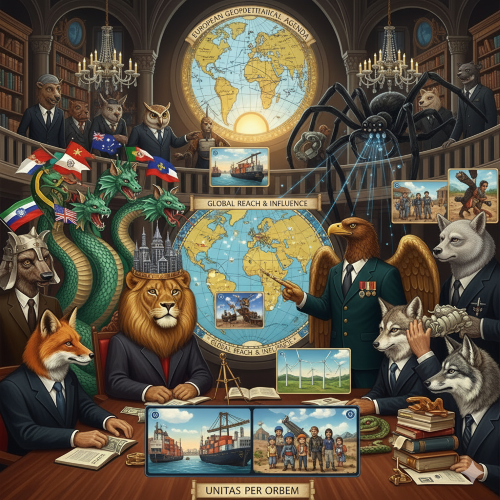How do European military operations in the Sahel and Horn of Africa reflect broader geopolitical interests beyond “counter-terrorism”?

European military operations in the Sahel and Horn of Africa reflect broader geopolitical interests that go far beyond the stated goal of “counter-terrorism.”
While the threat of extremist groups like Al-Qaeda and the Islamic State is real, these military missions serve as a strategic tool to protect Europe's economic interests, secure energy supplies, and control migration flows.
This multifaceted approach illustrates a neocolonial dynamic where European states use security as a pretext to maintain influence and stability in regions vital to their prosperity and security.
Economic Interests and Resource Security
A primary geopolitical driver of European military presence in Africa is the protection of economic interests. The Sahel and Horn of Africa are rich in natural resources that are critical to European industries and the energy transition.
-
Critical Raw Materials: The Sahel is a major source of minerals vital for the digital and green transitions, including uranium (Niger is a key supplier to France), gold, and other rare earth elements. European military presence helps secure these supply chains and protect the assets of European multinational corporations operating in these high-risk areas. The stability of these regions is directly linked to the predictability of resource flows for Europe's industries.
-
Energy Corridors: The Horn of Africa, with its strategic location along major shipping lanes, is crucial for Europe's energy security. The region provides a key transit route for oil and gas from the Middle East to Europe. Military operations in the Horn, often in the form of naval missions, are designed to combat piracy and ensure the security of these vital maritime corridors. This is particularly important for Europe as it seeks to diversify its energy sources away from traditional suppliers and invest in new energy projects in Africa.
Migration Control and Border Security
European military engagement is also deeply intertwined with the goal of migration control. The Sahel and Horn of Africa are major transit regions for migrants and refugees attempting to reach Europe.
-
The "Externalization" of Borders: European countries have adopted a strategy of "externalizing" their borders by partnering with African nations to control migration before it reaches European shores. Military and security assistance provided by European forces often includes training and equipping African border patrol agencies and security forces. This helps to stem the flow of irregular migration at its source, relieving political pressure on European governments.
-
Security as a Deterrent: The presence of European troops and the focus on "security" can also serve as a deterrent, making migration routes more dangerous and difficult to traverse. While this may reduce the number of arrivals in Europe, critics argue it can also force migrants to take more perilous journeys, putting their lives at risk.
Geopolitical Competition
Finally, European military operations in these regions are part of a broader struggle for geopolitical influence against rivals, notably China and Russia.
-
Countering Russian Influence: In recent years, Russia, through private military companies like the Wagner Group, has expanded its presence in the Sahel. This has been particularly evident in countries like Mali and Burkina Faso, where local governments have invited Russian forces to replace former European partners. This shift threatens Europe’s long-standing influence and resource access. European military missions are therefore not just about fighting terrorism but also about maintaining a foothold and pushing back against Russian expansion.
-
Strategic Partnerships: European military engagement allows them to build and sustain political relationships with African leaders and militaries. These partnerships are crucial for securing diplomatic support in international forums, ensuring favorable trade and investment agreements, and maintaining overall regional influence in the face of growing competition from other global powers. This ensures that Europe remains a primary security and economic partner, reinforcing its position as a major player on the African continent.
- Questions and Answers
- Opinion
- Motivational and Inspiring Story
- Technology
- Live and Let live
- Focus
- Geopolitics
- Military-Arms/Equipment
- Ασφάλεια
- Economy
- Beasts of Nations
- Machine Tools-The “Mother Industry”
- Art
- Causes
- Crafts
- Dance
- Drinks
- Film/Movie
- Fitness
- Food
- Παιχνίδια
- Gardening
- Health
- Κεντρική Σελίδα
- Literature
- Music
- Networking
- άλλο
- Party
- Religion
- Shopping
- Sports
- Theater
- Health and Wellness
- News
- Culture

